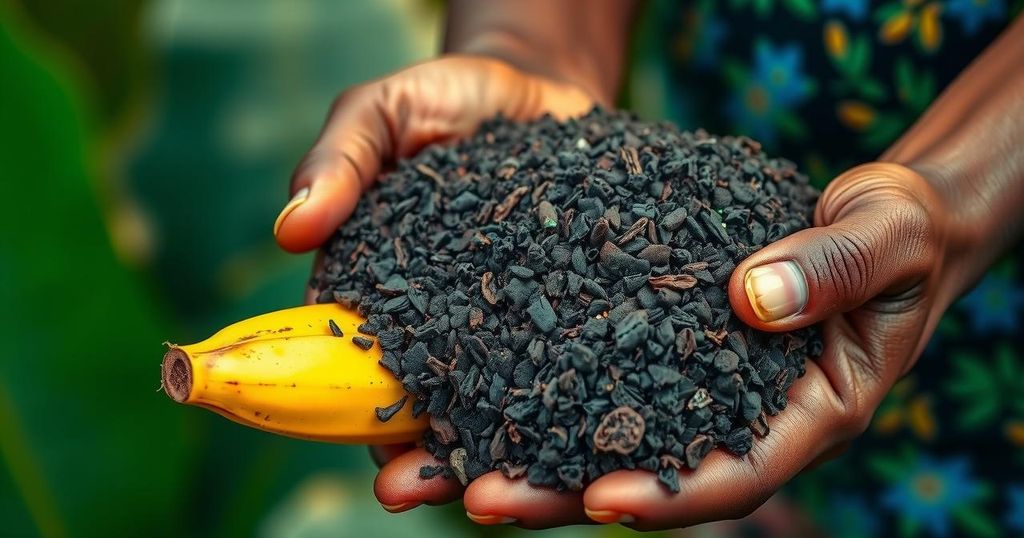Innovative Biochar Production from Banana Peels Addresses Deforestation in Cameroon
Steve Djeutchou is addressing deforestation in Cameroon by converting banana peels into biochar, a sustainable alternative to traditional charcoal. He produces about three tons of biochar monthly and operates a training school for renewable energy. Despite his efforts, he underscores the need for more resources to scale production, as the country continues to lose significant forest area due to charcoal production.
In Cameroon, where a significant portion of Africa’s forests reside, the increasing production of charcoal poses a serious environmental risk. To address this challenge, Steve Djeutchou has taken the initiative to convert organic waste, especially banana peels, into biochar—a more sustainable form of charcoal. Despite producing three tons of biochar each month, Steve recognizes that he requires further resources to scale his operations significantly. The continuous rise in charcoal production, which reached nearly 375,000 metric tons annually, has resulted in the loss of over 700,000 hectares of forest from 2002 to 2020, according to Global Forest Watch.
In addition to his biochar production business, Steve has established a training school focusing on renewable energy, aiming to empower individuals with the knowledge necessary to drive sustainable practices in their communities. His dedication to waste recovery education contributes to local skills development in renewable energy sectors. This training initiative fosters a community of individuals who share a commitment to environmental stewardship and sustainable industrialization in Cameroon.
Steve’s approach includes utilizing a local network of suppliers to ensure a steady supply of organic waste, estimating that approximately 40 metric tons of biomass can be collected daily in Yaoundé alone. By converting this organic material into usable biochar, he not only provides a cost-effective alternative to traditional charcoal, priced at 250 francs per kilogram compared to the conventional 500 francs, but also mitigates environmental degradation. Through meticulous processes involving carbonization, shredding, and compacting, the waste is transformed into eco-friendly fuel, which also produces less smoke, thereby addressing indoor air quality concerns for consumers like Cindy, a local mother.
Steve’s endeavor represents a vital step in combating deforestation and promoting sustainable energy solutions within Cameroon and potentially, the wider African continent. By nurturing local capabilities through education, he is laying an essential foundation for a resilient renewable energy future.
The context of this initiative is framed against the alarming rates of deforestation in Cameroon, which has been attributed primarily to rampant charcoal production. In light of losing vast expanses of forest, individuals like Steve Djeutchou have started to innovate by repurposing organic waste materials into more sustainable alternatives. Biochar not only serves as a substitute for traditional charcoal but also contributes significantly to reducing waste, contamination, and greenhouse gas emissions associated with conventional charcoal production methods. Steve Djeutchou’s training programs in renewable energy further emphasize the potential for local community engagement in sustainable practices, illustrating an avenue for higher education and professional skill development in areas critical to addressing environmental challenges.
In conclusion, Steve Djeutchou’s work in transforming banana peels into biochar epitomizes a sustainable response to the charcoal crisis in Cameroon. His dual efforts in waste management and education promote a holistic approach to environmental conservation and renewable energy that could significantly alter the landscape of energy consumption in the region. By establishing a local understanding of renewable practices through training, Steve is not only addressing immediate ecological concerns but is also cultivating the next generation of environmental advocates and practitioners, thus contributing positively to the battle against climate change.
Original Source: news.mongabay.com




Post Comment